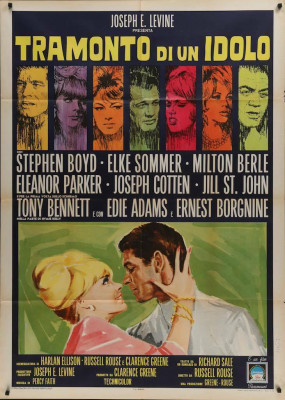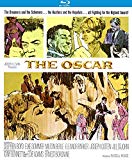| Reviews & Columns |
|
Reviews DVD TV on DVD Blu-ray 4K UHD International DVDs In Theaters Reviews by Studio Video Games Features Collector Series DVDs Easter Egg Database Interviews DVD Talk Radio Feature Articles Columns Anime Talk DVD Savant Horror DVDs The M.O.D. Squad Art House HD Talk Silent DVD
|
DVD Talk Forum |
|
|
| Resources |
|
DVD Price Search Customer Service #'s RCE Info Links |
|
Columns
|
|
|
Oscar, The
For years far too much of the criticism was dumped on co-star Tony Bennett, in his first and last acting role in a feature film. Considering that he was never an actor to begin with, he's actually not so bad. Rather, it's the star of the film, Stephen Boyd, who truly dazzles with his wild-eyed, teeth-baring portrait of a cruel, ambitious film star Frankie Fane. His may be the worst starring performance in a major American feature film in the history of motion pictures.
At the Academy Awards (held during those years at the Santa Monica Civic Auditorium), movie star Frankie Fane, nominated for Best Actor, waits anxiously while, in flashback, his longtime friend Hymie Kelly (Tony Bennett), also in the audience, recounts Fane's cutthroat climb to stardom.
Years before Fane was a spieler for his stripper girlfriend, Laurel (Jill St. John), who dumped Hymie for Fane sometime earlier. After they're arrested (by Broderick Crawford, varying his Highway Patrol character) on trumped-up charges of pimping and prostitution they move, nearly penniless, to New York, where she works while Fane lazily lives off her earnings. He flirts (with uncomfortable #metoo-ness) with German fashion designer Kay Bergdahl (Elke Sommer), he accompanying her while she delivers costumes to an off-Broadway play. There, Fane impresses middle-aged Hollywood talent scout Sophie Cantaro (Eleanor Parker) with his cocky meddling of the staging of a knife fight. He's soon cast in the play and becomes her latest discovery. An angry Laurel, now pregnant with Fane's child, dumps her boyfriend and marries kindhearted Hymie, but she dies while miscarrying.
Later, Sophie convinces agent Alfred "Kappy" Kapstettler (Milton Berle) to take on the angry young man, and together they use their influence to pressure Galaxy Pictures studio head Kenneth H. Regan (Joseph Cotten) to sign Fane to a contract. Fane's take-no-prisoners approach destroys everyone in way to fame and fortune, but steadily he climbs Hollywood's ladder to the top of his profession. Nevertheless, an encounter with fallen ex-star Steve Marks (Peter Lawford), now working as a maître d' at a Hollywood restaurant, unnerves him. Can he stay on top much longer?
Somewhat incredibly, this independent production (Embassy Pictures, released through Paramount) received full cooperation from the Academy of Motion Pictures Arts & Sciences, allowing them to film second unit footage at an actual awards ceremony, and freely use the Oscar statuette. Further, many stars and Hollywood insiders appear as themselves, including Bob Hope (as the Oscars host), Merle Oberon (who presents the Best Actor Award), costume designer Edith Head, columnists like Hedda Hopper (dead by the time The Oscar was released) and James Bacon, and even the "Mayor of Hollywood" himself, Johnny Grant. The picture bursts at the seams with great footage of the Hollywood scene as it existed (or was imagined to exist) circa the mid-1960s. Though the story seems to cover about a decade, from start to finish it's firmly locked in the time in which it was made.
It's not all terrible, either. A few actors come off surprisingly well, especially Peter Lawford's humbled ex-actor, and Edie Adams's aspiring actress. Her character, like Cotten's Studio head and Ernest Borgnine's sleazy private eye, see right through Fane's machinations, which may be why their parts are less embarrassing than those played by Bennett, Sommer, and Parker, who devote far too much of themselves to a cad so obviously and completely self-absorbed. They end up looking like clueless fools. Milton Berle was singled out at the time for his straight dramatic role as Fane's agent; while it's not an extraordinary performance it is a good one, no matter that the film's so terrible.
The Oscar's critique of Hollywood business is not without some verisimilitude. Cotten's studio head describes actors as cuts of meat and, in a later scene, weighs his box-office value relative to pictures mainly successful for other stars like John Wayne that carried Fane along. When Fane is reduced to starring in a TV pilot for a series, he must contend with a sponsor (Walter Brennan) much more interested in selling widgets than in Fane's abilities or the quality of the show.
But the awful dialogue and Boyd's huffin'-and-a-puffin' hysterics simultaneously doom The Oscar while rendering it a delight of unintended comedy. The quotable lines, vying for hip, industry-insider lingo, are ridiculous in the extreme. Hymie narrating: "Man, he wanted to swallow Hollywood like a cat with a canary. And he did it! The parts got bigger, and Frankie was hooked! Like a junkie shooting pure quicksilver into his veins, Frankie got turned on by the wildest narcotic known to man: success! The parts got bigger and bigger... Frankie got hungrier and hungrier." And, after being criticized by Kay, Fane's response: "Will you stop beating on my ears? I'm up to here with all this bring-down!"
Northern Irish actor Boyd is best remembered as Messala in Ben-Hur (1959) opposite Charlton Heston. He was by no means a bad actor, having been perfectly fine, for instance, in Fantastic Voyage, released the same year as The Oscar. (I'm particularly fond of Boyd's late-career Western made, the forgotten The Man Called Noon.) For no clear reason co-screenwriter/director Russell Rouse let Boyd run amok in The Oscar. No one would accuse Boyd of holding anything back. More nuanced playing would not have saved the picture, but it might have made it less surreally loopy.
Video & Audio
Kino's Blu-ray of The Oscar looks great, utilizing a new 4K restoration presented in 1.66:1 widescreen. There are signs of damage at the beginning (or end) of one reel for several seconds, but even that's barely noticeable. Colors and contrast are strong throughout. The DTS-HD Master Audio (mono) is excellent and optional English subtitles are provided on this region "A" disc.
Extra Features
Wisely, two audio commentary tracks are offered, one featuring Patton Oswalt, John Olson, and Erik Nelson focusing on the unintended laughs (but also some in-depth info on Ellison's work), while film historians Howard S. Berger, Steve Mitchell, and Nathaniel Thompson opt for an alternate approach in exploring the film a bit more seriously.
Parting Thoughts
Terrible but very entertaining, The Oscar is Recommended.
Stuart Galbraith IV is the Kyoto-based film historian currently restoring a 200-year-old Japanese farmhouse.
|
| Popular Reviews |
| Sponsored Links |
|
|
| Sponsored Links |
|
|
| Release List | Reviews | Shop | Newsletter | Forum | DVD Giveaways | Blu-Ray | Advertise |
|
Copyright 2024 DVDTalk.com All Rights Reserved. Legal Info, Privacy Policy, Terms of Use,
Manage Preferences,
Your Privacy Choices | |||||||















